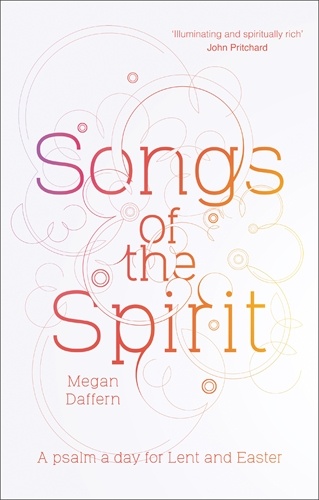Songs of the Spirit by Megan Daffern
No better way to journey through Lent than to root our prayer life in the Psalms - and Daffern is a wise and knowledgeable guide
 Songs of the Spirit
Songs of the Spirit
By Megan Daffern
SPCK
ISBN 978-0-281-07796-0
Reviewer Rosa Hunt
“Most of us read to acquire knowledge or to satisfy our curiosity … The purpose of spiritual reading, however, is not to master knowledge or information, but to let God’s Spirit master us”, writes Henri Nouwen.[1] Many Christians have adopted the practice of such “spiritual reading” specifically for the season of Lent. We are often aware that the pace of life has a punishing effect on our interior peace and stillness, and yet we lack the motivation to discipline ourselves to make the time and space necessary each day to encounter the Spirit of God. We hope that adopting a ‘Lent book’ can provide exactly the motivation we need.
This book on the Psalms by Megan Daffern is a classic Lent book in the sense which I have just described. Each day during Lent, starting from Ash Wednesday and culminating on Easter Saturday, is assigned a Psalm, or part thereof. Sundays are kept free, with the evident expectation that Christians will gather in public worship. The daily readings are labelled as “Week 1 Monday” etc, and this makes it very easy to find the right day, even if you have missed a day or two.
The book’s overall structure functions as a journey from despair (Week 1: It’s a Hard World), through pilgrimage (Week 5: From Place to Place) to redemption (Week 7: A Redeemed World).
Each individual reading starts with the author’s own translation of the psalm from the Hebrew, and this is one of the enormous strengths of this book. Daffern’s translations are fresh and arresting, and the combination of careful scholarship with a deep personal faith has resulted in translations which are a delight to read.
My reading this morning was from Psalm 2, where Daffern renders v. 1 as “why are … peoples murmuring in emptinesses?”, and in v. 9 has God promising His anointed Son that He will smash the nations to pieces “like a china teacup”. Her vivid and unusual turns of phrase helped me to grasp the psalmist’s meaning more profoundly, while remaining faithful to the text in every way which matters.
The psalm is then followed by a commentary, which usually runs to two or three pages. Where she deems it helpful, Daffern does not hesitate to make scholarly comments on the meaning of individual Hebrew words in the psalm, and so one could certainly “acquire knowledge or satisfy curiosity” by reading this book.
But Daffern’s aim is that the psalms would teach us how to pray, and that in so doing, we would find peace. And so the commentaries explore the emotions and conflicts expressed in the psalms, and invite us to recognise areas of our own lives where we can identify with the same feelings and problems as those expressed by the psalmist.
Daffern seeks out practical wisdom from each psalm which we can apply in our 21st century context as we journey through Lent towards reconciliation and peace - with God, with ourselves, and with the world. And she regularly brings us back to Jesus, who made these psalms His own.
Finally, each daily reading ends with a question, such as “Who are shepherds in our society?” for Psalm 23, or “Do you have angry thoughts and feelings you can hand over to God?” for Psalm 137. Of course, these can be used by individuals to reflect on what they have just read, and I think that this could work well, although I sometimes struggled when the question posed by Daffern didn’t address what I had discerned as the key message of the psalm for me that day. This is the disadvantage of only having one question - the advantage is obvious to those who don’t have much time to read and reflect!
However, the suggestion at the front of the book is that the book could also be used in a small group context, where the members read the six psalms at home over the course of the week, and then come together on a weekly basis to discuss their answers to the questions. I haven’t tested this out, but I am not sure that it would work without an experienced and compassionate group leader. The questions are too personal and profound to lend themselves easily to a weekly discussion without a lot of additional ‘warm-up’ discussion, and in any case discussing six psalms in an hour’s meeting seems like a tall order.
That caveat aside, I would heartily recommend this book to all those who wish to enrich their Lenten journey in 2018. There can be no better way to journey through Lent than to root our prayer life in the Psalms, and Megan Daffern is a wise and knowledgeable guide on this journey.
Rosa Hunt, minister of Capel Salem in Tonteg, South Wales, and part-time tutor at South Wales Baptist College
[1] Henri J.M. Nouwen, Here and Now: Living in the Spirit (London: Darton, Longman and Todd, 1994) p.58.
Baptist Times, 18/01/2018